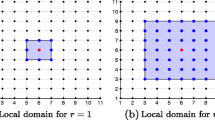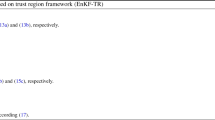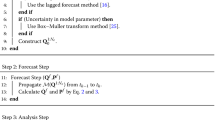Abstract
Several variations of the Kalman filter, such as the extended Kalman filter (EKF) and the unscented Kalman filter (UKF), are widely used in science and engineering applications. However, traditional UKFs or EKFs cannot assimilate big data sets associated with models that have high dimensions, such as those in operational numerical weather prediction. In this chapter, we introduce two sparsity-based Kalman filters, namely the sparse-UKF and the progressive-EKF. The filters are designed specifically for problems with high dimensions. Different from ensemble Kalman filters (EnKFs) in which the error covariance is approximated using a set of dense ensemble vectors, the algorithms developed in this chapter are based on the sparse matrix approximation of error covariance. The new algorithms enjoy several advantages. The error covariance has full rank without being limited within a subspace generated by a set of ensembles. In addition to the estimated states, the algorithms provide updated error covariance in every assimilation cycle. Taking the advantage of sparsity, the required memory size and computational load can be significantly reduced.
This work was supported in part by U.S. Naval Research Laboratory—Monterey, CA.
Access this chapter
Tax calculation will be finalised at checkout
Purchases are for personal use only
Similar content being viewed by others
References
Davidson ER (1989) Super-matrix methods. Comput Phys Commun 53(1–3):49–60
Davis TA (2006) Direct methods for sparse linear systems. SIAM
Davis T, Rajamanickam S, Sid-Lakhdar WM (2016) A survey of direct methods for sparse linear systems. Acta Numer 25:383–566
Houtekamer PL, Zhang F (2016) Review of the ensemble Kalman filter for atmospheric data assimilation. Mon Weather Rev 144:4489–4532
Julier S, Uhlmann J, Durrant-Whyte HF (2000) A new method for the nonlinear transformation of means and covariances in filters and estimators. IEEE Trans Autom Control 45(3):477–482
Julier SJ, Uhlmann JK (2004) Unscented filtering and nonlinear estimation. Proc IEEE 92(3):401–422
Kang W, Xu L (2021) Some quantitative characteristics of error covariance for Kalman filters. Tellus A: Dyn Meteorol Ocenogr 73(1):1–19
Lorenz E (1996) Predictability—a problem partly solved. In: Seminar on predictability, vol I. ECMWF
Rozin E, Toledo S (2005) Locality of reference in sparse Cholesky factorization methods. Electron Trans Numer Anal 21:81–106
Xu L, Rosmond R, Daley R (2005) Development of NAVDAS-AR: formulation and initial tests of the linear problem. Tellus 57A:546–559
Author information
Authors and Affiliations
Corresponding author
Editor information
Editors and Affiliations
Rights and permissions
Copyright information
© 2022 The Author(s), under exclusive license to Springer Nature Switzerland AG
About this chapter
Cite this chapter
Kang, W., Xu, L. (2022). Sparsity-Based Kalman Filters for Data Assimilation. In: Park, S.K., Xu, L. (eds) Data Assimilation for Atmospheric, Oceanic and Hydrologic Applications (Vol. IV). Springer, Cham. https://doi.org/10.1007/978-3-030-77722-7_4
Download citation
DOI: https://doi.org/10.1007/978-3-030-77722-7_4
Publisher Name: Springer, Cham
Print ISBN: 978-3-030-77721-0
Online ISBN: 978-3-030-77722-7
eBook Packages: Earth and Environmental ScienceEarth and Environmental Science (R0)




